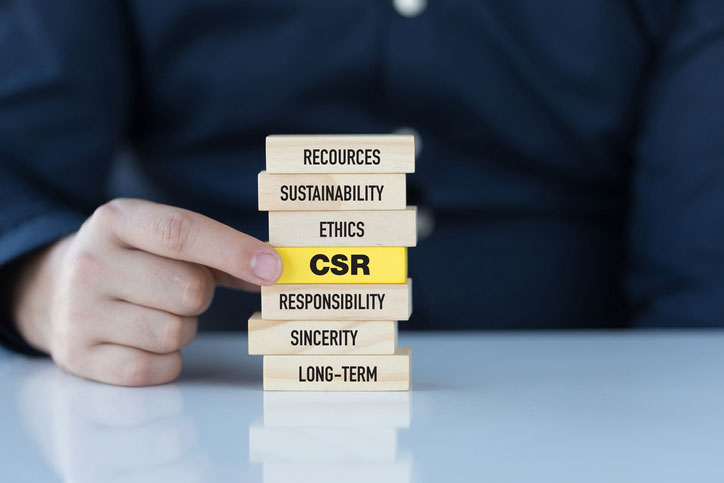Written by Scott Wilson

What is corporate social responsibility? Corporate Social Responsibility (CSR) is a philosophy and system of practices that businesses adopt as a way to independently support the values and goals of the society they exist within. It’s a form of self-regulation and philanthropic effort that pushes back against the pure profit motive with larger goals of environmental responsibility, equity, and inclusivity in mind.
Responsibility comes with the job for every leader. When taking charge, making plans, and calling the shots, the results—good and bad—come back to the people in charge.
When leaders make the call to cross-train staff and increase productivity in a construction company, for example, they reap the rewards of that call.
And similarly, if a financial services company, for example, is encouraging clients to engage in risky investment strategies, or talking them into opening accounts for services that aren’t in their best interests, leaders also have a moral role when they lose money. And if executives at a railroad company approve the decision for industrial waste to be moved in cars without modern braking systems as a cost-savings measure, it’s on leadership when there’s a derailment and the local water supply is contaminated.
These examples aren’t what you would consider corporate social responsibility. But they are the kind of ethical decisions that business leaders are frequently faced with.
All leaders are tuned in to the relationship between decisions and outcomes at the organizational and legal levels and the implications those decisions have for themselves and the business. But the same moral relationship between decisions and the results of those decisions exists at a societal level too, and this is where CSR comes in.
Every organizational leadership degree comes with a healthy helping of ethical training. But for the most part, that training, and the uses it applies to, are narrowly defined: treating employees and customers with respect and honesty, making decisions from a place of objectivity, and handling sensitive situations with probity and decency.
Corporate social responsibility expands the role of ethics in organizational leadership well beyond such immediate examples and implications.
Corporate Social Responsibility Definition

Stated broadly, a corporate social responsibility definition might be this: the idea that for-profit organizations have a role in creating a better, healthier, more sustainable society as well as creating economic value.
This takes the concept of value itself and extends it beyond the realm of dollars and cents. CSR calls for companies to self-regulate in ways that benefit society, even if they do not maximize profitability.
Many bold leaders have found ways that CSR itself creates economic value. The benefits of corporate social responsibility come through reputation and branding.
It turns out that it’s not a one-way street, however. Catering to a new generation of consumers who value sustainability, green products, and equity is itself a profitable endeavor. That means leaders pursuing a strategy of social responsibility and corporate citizenship are seeing benefits both in terms of company reputation and revenue.
Defusing Debates over How to Define Corporate Social Responsibility
This definition of corporate social responsibility isn’t universally shared. The idea that for-profit organizations should be pursuing a strategy of social responsibility and corporate citizenship hits different people in different ways.
To some, it’s a misplaced concept in the first place. In this view, corporations exist to create economic value. Government and non-profits are the entities that drive social capital forward. This view holds that it is a mistake for businesses to attempt to define and weigh social obligations at all. With the limited number of stakeholders and decision-makers, not to mention built-in conflicts of interest, it’s inevitable that corporations will get it wrong. Instead, relying on more democratic and grassroots institutions to put guardrails and laws in place to enforce responsibility is a better approach.
To others, it’s all window-dressing, an attempt by corporations to whitewash inherently negative social impacts. Unfortunately, there are certainly examples of corporate social responsibility efforts that have been used this way. Volkswagen, for example, put a lot of marketing dollars behind campaigns that persuaded consumers that their vehicles were some of the lowest-emission and most environmentally friendly options in the market.
But in 2015, the Environmental Protection Agency (EPA) discovered that many VW vehicles sold in the United States incorporated software devices to detect when they were being statically tested for emissions, reducing performance at those times to lower emissions output. When on the open road, the restrictions clicked off to improve power—and increased nitrogen oxide pollution to 40 times the limit required by law.
This differing viewpoints can make it hard to define corporate social responsibility. But that doesn’t mean you shouldn’t try.
The Definition of Corporate Social Responsibility Will Always Shift With Society Itself
 CSR isn’t necessarily new, although it has a new name and a new culture. But at some level, corporations throughout history have had some recognition of their own impact on society and have made efforts to give back as reflected by society at the time. The great American industrial triumphs of two world wars tied back to businesses pulling together behind society; your local Carnegie library is a physical expression of the value that Andrew Carnegie placed on literacy and educating the population.
CSR isn’t necessarily new, although it has a new name and a new culture. But at some level, corporations throughout history have had some recognition of their own impact on society and have made efforts to give back as reflected by society at the time. The great American industrial triumphs of two world wars tied back to businesses pulling together behind society; your local Carnegie library is a physical expression of the value that Andrew Carnegie placed on literacy and educating the population.
Although we don’t look back on the corporate titans of the 1800s with favor today, many of them did give back more than they had to at the time for a variety of social reasons. During the Panic of 1893, James J. Hill, the Empire Builder himself, lowered shipping rates for farmers and granted credit to many businesses that owed him money so they could make payrolls. He kept ticket costs for immigrants to a flat $10 to allow them to move West, encouraging settlement.
Although none of these efforts or individuals would pass muster with social responsibility concepts as we define them today, they were very much in line with the views of generosity and value that society held at the time. CSR today will reflect the same perspectives and deficits when viewed from 150 years on.
The Benefits of Corporate Social Responsibility - Why is Corporate Social Responsibility Important?

The rise of the importance and impact of corporate social responsibility reflects the overall value that society places on responsible leadership and ethical behavior. Recognition of the impacts that large, multinational corporations have had on society through profit-driven behaviors is a mainstay in modern news reporting.
Just as importantly, however, it’s a recognition of the very real role that corporations play in shaping the world that we all live in. It’s impossible to overstate the impacts of economic development on the environment, on infrastructure, and on the social relationships and expectations that are woven through our communities.
Starbucks corporate social responsibility comes through their commitment to fair-trade coffee, which helps ensure sustainable access to their core product while promoting a better life and livelihood for suppliers.
With the significant assets and economic might packed into American corporations, it’s inevitable that they have an outsized role in shaping our world. And if that’s the case, then the leaders of those companies have a huge responsibility to all of the rest of us to act in line with the welfare of society as a whole. With an estimated output of $41 trillion in 2022, private industry represents nearly 70 percent of GDP.
But more than just the raw financial impact of corporate activity is involved. Corporations are active in shaping our social expectations and even our interpersonal interactions. Consider the more than $600 million spent by the fashion industry in 2021. That went into influencing what millions of Americans think of as cool and attractive. It affects the interests and self-esteem of teenagers everywhere.
Or think about social media companies, or smart phone manufacturers. The structure of their very devices, the ways that we communicate, impact interactions daily. The algorithms can shift our attention instantly… bringing stories to page one in a matter of hours or burying them entirely overnight.
That sort of power requires real responsibility. And CSR is how leaders can exercise that responsibility.
Corporate Social Responsibility Examples: How To Make CSR A Key Piece of Your Organizational Leadership Principles
As a leader watching big oil companies or financial providers getting raked over in the media nightly, it’s important to learn how to implement CSR without killing your organization.
For starters, you need to understand where your customers are coming from. Their views on your responsibility are the social perspectives that you need to incorporate in your strategic planning and communication. And unsurprisingly, those perspectives can vary with different market segments.
Today, the three major factors associated with corporate social responsibility are:
- Environmental Impact
- Ethical Sourcing
- Social Justice
And each of those factors have both social and economic benefits for wise leaders to tap into.
Environmental Impact
The raw materials and production processes of many organizations are one of the biggest footprints they leave as a byproduct of their business. Finding sustainable sourcing isn’t just an ethical bonus, however; it ensures that a business has a long and bright future ahead of it, the kind of long-term planning that organizational leadership is known for.
Ethical Sourcing
Second, ensuring that the labor that goes into producing and distributing goods is treated well and paid fairly is a major concern. But it also builds a reliable, motivated workforce, which is exactly in line with the tenets of organizational leadership in the first place.
Social Justice
Finally, creating products and services that are in line with the values of the community and that promote justice for marginalized groups is important. This can come through the design of business itself, or efforts at community development, pro bono work, or other contributions to the effort.
There are a wide range of ways that companies express their commitment to CSR. Not everyone is in a business that lends itself to a structure that is recognizable as social responsibility… a law firm, for example, can’t do much in the way of sustainable product development or manufacturing processes. But they can devote pro bono time to various socially responsible causes.
The Pyramid of Corporate Social Responsibility
 Many ethical business leaders approach these problems through the lens of the so-called pyramid of corporate social responsibility. This stacks the various obligations of a corporation in an understandable and actionable way that combines both core business obligations and social responsibilities.
Many ethical business leaders approach these problems through the lens of the so-called pyramid of corporate social responsibility. This stacks the various obligations of a corporation in an understandable and actionable way that combines both core business obligations and social responsibilities.
Although there are different versions of the pyramid, the most popular is this:
- Philanthropic Responsibilities – At the top of the pyramid, businesses may undertake philanthropic actions if they have fulfilled all the other criteria below.
- Ethical Responsibilities – Basic ethical responsibilities have to be fulfilled with respect to staff and customers.
- Legal Responsibilities – Businesses have to comply with the rules and regulations set down by lawmakers to remain legally in operation.
- Economic Responsibilities – At the base, a business has to undertake actions to remain solvent, or it is unable to fill any other obligations.
As you can see, each level of the pyramid is supported by the layers below. Even the best-intentioned business leader has to ensure that the business is functional, legal, and ethical before extra efforts can be supported in CSR.
Corporate Social Responsibility Examples To Take Inspiration From
Leaders interested in jobs in corporate social responsibility can take their inspiration from many major companies that have made CSR both responsible and profitable.
Apple Corporate Social Responsibility Commitments
 Apple was one of the first global companies to recognize and take action to reduce global warming. The company set and achieved a net-zero emissions goal. They further plan to extend that through their entire supply chain by 2030, pressing companies around the world to match. They’ve also taken steps to reduce the use of toxic and non-renewable materials in their product lines, and to increase recycling efforts when it’s unavoidable. The MacBook Air line, for example, is built with 40 percent recycled components.
Apple was one of the first global companies to recognize and take action to reduce global warming. The company set and achieved a net-zero emissions goal. They further plan to extend that through their entire supply chain by 2030, pressing companies around the world to match. They’ve also taken steps to reduce the use of toxic and non-renewable materials in their product lines, and to increase recycling efforts when it’s unavoidable. The MacBook Air line, for example, is built with 40 percent recycled components.
The company engages in CSR outside of just environmental causes, as well. In 2021, the $100 million Racial Equity and Justice Initiative (REJI) was launched to address systemic racism by funding developer training, minority venture capital, and technology supports for Historically Black Colleges and Universities.
Nike Corporate Social Responsibility Commitments
 Nike’s CSR efforts start with the community. The company put nearly $90 million into outreach in 2020 to boost youth sports programs for over 17 million kids globally. Another $100 million went into the Girl Effect program to improve the lives of girls around the world.
Nike’s CSR efforts start with the community. The company put nearly $90 million into outreach in 2020 to boost youth sports programs for over 17 million kids globally. Another $100 million went into the Girl Effect program to improve the lives of girls around the world.
And with the slogan “If there is no planet, there is no sport” the company has also leaned into sustainability initiatives, committing their supplies to carbon neutrality by 2025 with the Supplier Climate Action Program. The company has been converting plants and offices to 100 percent renewable energy sources and incorporating sustainable materials, like recycled leather, into new product lines.
It’s important to note that these efforts aren’t just good corporate citizenship—they are good business. As Nike recognizes, a world that is too hot for exercise, too burnt for nature, or too chaotic for sports is ultimately bad for their business. And the more money they put into encouraging healthy, active kids, the more future consumers they have for their products.
At Apple, their customer base is increasingly concerned about environmental issues and inclined to put their money where their values are. Keeping Apple products green keeps them popular in that segment.
And the company has long pursued a similar strategy to support future customers by offering steep discounts to education systems and students. Funding more developers from minority communities means creating more apps, products, and customers for Apple devices.
The fact that there are multiple goals attached to these strategies isn’t nefarious—instead, it represents good alignment between corporate social responsibility and the values of society overall… something that every organizational leader should aspire to.
At the same time, they also create space for these corporations to act independently, as their leaders decide and strategize. By recognizing the likelihood of government regulation in the absence of self-regulation, smart leaders keep their options open while still keeping the books in the black and shareholders happy.
Corporate Social Responsibility Jobs

If there is a place where modern corporations require strong leadership, it is certainly in the area of social responsibility. You don’t have to look far before finding some egregious examples of neglected responsibility… your morning paper headlines are usually far enough.
So there is a clear match for the sort of value and professional skill that organizational leadership graduates can bring to corporate social responsibility careers. In fact, you can even find OL degrees with concentrations and specialty areas that line up directly with jobs in corporate social responsibility, such as organizational leadership degrees in diversity, equity, and inclusion.
Sustainability is also a common component of CSR jobs. So pursuing an organizational leadership degree with a focus in sustainability leadership is another good play if you’re interested in CSR roles.
To take full advantage of corporate social responsibility, companies will need leadership that both understand the philosophy behind CSR and the business principles that make it a winning strategy. And those are all concepts that you will pick up by studying for a degree in organizational leadership in your field.




